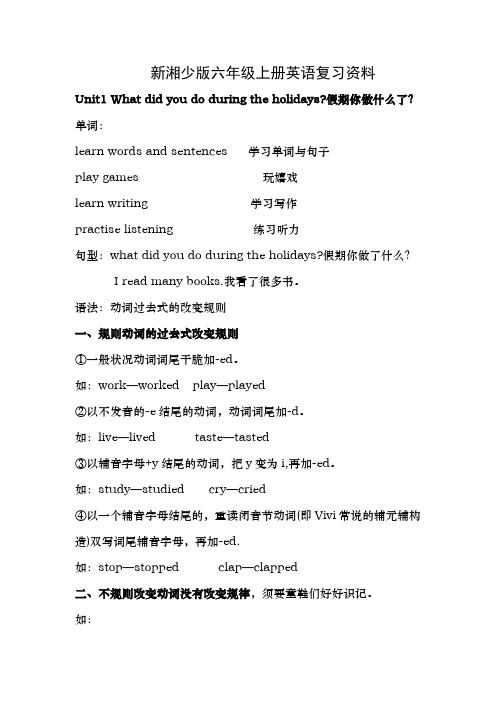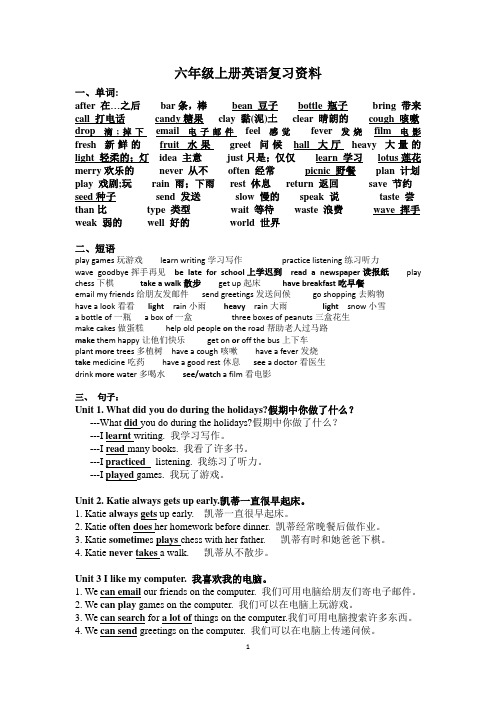新湘少版六年级上册英语复习资料
新湘少版六年级上册英语复习资料全

新湘少版六年级上册英语复习资料Unit1 What did you do during the holidays?假期你做什么了?单词:learn words and sentences 学习单词与句子play games 玩嬉戏learn writing 学习写作practise listening 练习听力句型:what did you do during the holidays?假期你做了什么?I read many books.我看了很多书。
语法:动词过去式的改变规则一、规则动词的过去式改变规则①一般状况动词词尾干脆加-ed。
如:work—worked play—played②以不发音的-e结尾的动词,动词词尾加-d。
如:live—lived taste—tasted③以辅音字母+y结尾的动词,把y变为i,再加-ed。
如:study—studied cry—cried④以一个辅音字母结尾的,重读闭音节动词(即Vivi常说的辅元辅构造)双写词尾辅音字母,再加-ed.如:stop—stopped clap—clapped二、不规则改变动词没有改变规律,须要童鞋们好好识记。
如:go—went make—made get—got buy—bought learn—learnt do—didtake—took have—had read—read speak—spoke teach—taught say—saidUnit2 Katie always gets up early凯蒂总是很早起床词汇:(频度副词:always总是、often经常、sometimes有时、never 从不)get up 起床return home 回家take a walk 去漫步do her homework 做她的家庭作业have breakfast/lunch/dinner吃早/ 中/ 晚餐play chess 下象棋wave goodbye 挥手再见read a newspaper 读报纸be late for school 上学迟到句型:Peter always gets up at 7:00 a.m。
湘少版小学英语六年级复习知识点

湘少版小学英语六年级复习知识点文稿归稿存档编号:[KKUY-KKIO69-OTM243-OLUI129-G00I-FDQS58-湘少版(湖南少年儿童出版社出版)小学英语教材知识点,使用湘教版小学英语教材六年级(de)老师应该用得着,这些知识点还是很全面(de),希望对您有所帮助.1.字母:(大小)辨认、书写顺序;元音字母:A a , Ee, Ii, Oo, Uu2. 数字:1~999(de)基数词和序数词(de)运用,如计算、购物、时间、日期等.句型:①What's your number②What’s the time③How many pens are there④How old are you⑤How much is it⑥How tall are you⑦How heavy are you⑧What time do you get up⑨When's your birthday⑩What time did you see him3. 颜色:单词:red, pink, yellow, brown, blue, purple, orange, black, white, green.句型:①What colour is it②What’s your favourite colour4. 时间:年、季节、月、星期、日、时刻:Season( spring, summer, autumn, winter)Month: January, February, March, April, May, June, July, August, September, October, November, December.Week:Sunday, Monday, Tuesday, Wednesday, Thursday, Friday, Saturday.Day:1st May (the first of May), May 2nd ( May the second)句型:见话题2.5. 食品与饮料:人对食品与饮料(de)喜好;东西方食品.句型:①I like biscuits.②I’d like a cold drink.③Would you like some buns④Do you want some rice⑤This isn’t my food.6. 服装:服装(de)颜色:人对服装(de)喜好;某人(de)穿戴;所属关系;位置等.句型:①I like the green T-shirt.②Where’s my new cap③Who’s shirt is this④Is this your hat7.物品:名词(de)单、复数;特点、颜色、所属关系;存在(de)位置(in, on, under, beside, behind, in front of, above, near, inside, outside).玩具(toy car, doll, )文具(desk, book, bag ,pen, pencil, pencil-box, ruler, pencil sharpener,)句型:①What’s this②What colour is it③Whose is this④This is my brother’s painting.⑤I have a puppet.⑥There's a car near the hospital.⑦Was it in the wardrobe⑧Is there a book on the desk⑨That's not mine.8.动物和植物:cat, dog, duck, fish, sheep, bird, panda, monkey, rabbit, hen , cock, chick, tiger, lion, pig, cow , mouse (mice), elephant, ladybird, puppy, tree, flower, rose,9. 建筑与场所:factory, hospital, park, house, library, museum, office, farm, post office, bank, police station, railway station, bookstore, school, classroom, skating rink, café, house(ba throom, living-room, sitting-room, bedroom,kitchen),garden…10. 身体:head, hair, eye, nose, ear, mouth, neck, hand, finger, foot(feet) ,toe…外貌: fat, thin, tall, short, old, young, two big blue eyes, long hair, short hair, black hair. 句型:①This is my nose.②Touch your head.③Raise your arm.11. 个人情况:姓名、年龄、地址、特点与爱好.句型:①I'm twelve years old.②My hobby is reading.③I like music.④I'm interested in space.⑤My name is Peter.⑥I'm tall and thin.⑦Do you have any hobbies12. 家庭、亲属和朋友:姓名、年龄、地址、职业、特点与爱好、与你(de)关系family, grandfather(grandpa/granddad), grandmother(grandma/grand mum), father, mother, brother, sister, uncle, aunt, cousin, friend.句型:①Who's heHe's my father.②He's a doctor③He likes playing games.④My father helps me.⑤Is he a soldier⑥What’s he13. 学校:学校建筑和学校生活.school, classroom, library, playground, Chinese, maths , English, music, computer, PE, art, science,句型:①When do you go to school②What time do you have English14. 情绪和身体状态:happy, sad, tired, angry, shy, sorry, well, sick,句型:①I'm sick.②I'm happy.③We are sorry.④ I feel sad.15. 社交礼仪:礼貌用语;询问与应答.句型:问候①Hello./ Hi.②Good morning/afternoon/evening.③How are you ④How do you do⑤Glad to meet you./ Nice to meet you.介绍①My name is…②I’m a pupil.③I’m 12.④This is our teacher, Miss Chen.⑤He is from Japan.道别①Goodbye./Bye.②See you.③Good night.道谢①Thank you./Thanks.②You’re welcome.道歉①Sorry.②I’m sorry.③Excuse me.请求①Can I have a puppy ②Can I borrow a pencil ③Yes, please.④Of course.祝愿①Happy birthday.②Merry Christmas.提供帮助①Can I help you ②What can I do for you ③What’s the matter寻求帮助和建议①What can I do用餐①Do you want some soup ②Would you like some rice ③I'd like a cold drink.购物①Which one do you want ②Can I look at it ③I want a red one, please.④It's too expensive.⑤Have you got enough money⑥How much is it16.国家与国庆日:China, Japan, America (the USA), English( the UK), Australia, Russia, Canada, Singapore, India, France,句型:①When’s your country’s National Day②I come from China.17.天气与气候特征:hot, cold, cool, warm, sun, sunny, rain ,heavy rain, rainy, wind, strong wind,windy, snow , heavy snow, cloud, cloudy, …句型:①What's the weather like②It’s a cold day.③Spring is warm and nice.④Tomorrow will be rainy.⑤I like a sunny day.18. 节日:节日(de)特点;节日(de)活动.New Year's Day, Spring Festival, Children's Day, Mid-autumn Festival, Teachers' Day , National Day, Christmas Day, Dragon Boat Festival.19. 正在发生(de)事情:现在进行(de)动作和发生(de)事.句型:①Are you making a kite②Peter is writing.③What's Anne doing④Where are you going⑤What are they doing⑥Is he running20.日常生活:日常生活、工作、学习(de)活动.句型:①I come to school by bus.②Your homework is good.③What time do you get up④She always get up early.21. 计划与打算:计划和将要进行(de)动作be going to do …句型:①I’m/You’re /He’s/She’s /We’re/They’re (not) going to swim.②Are you going to swim③Is he/she going to visit Anne④What are you going to do⑤What is he going to do⑥When are they going to swim⑦Tomorrow will be rainy.⑧ I'll stay at home.22. 能力和可能:能做某事或可能进行某事.句型:①Can you read and write in English②Can I have a puppy③What can you do④She can run fast.23. 过去发生(de)事情或过去(de)打算:过去式.句型:①Where were you②Who was first③Was it in the wardrobe④Benny took my ball.⑤Where did you go⑥What did you do⑦I came by plane.⑧Anne wanted to skate.24. 对事物(de)比较:比较级和最高级.句型:①My singing is louder than yours.②I’m taller than you.③There more shops in Picture One.④Some stories are more interesting than others.⑤The most interesting stories.⑥Who is fatter25.提醒与告示:①What does that sign mean②Draw a cat on the roof.③Don't put your feet on the seat.④No speaking.⑤Do not go in.26.擅长和喜欢(de)事情:①I'm/ You're/ He's good at drawing.②I like playing basketball.。
湘少版六年级上册英语复习重点(精修版)

湘少版英语精品资料(精修版)小学英语六年级(上)复习资料Unit 1 What did you do during the holidays? 你在假期都做些什么?●词汇:holiday 假期during 在...期间speak 说learn words and sentences 学习单词和句子play games 玩游戏learn writing 学习写作practise listening 练习听力●语法:一般过去时:表示过去某个时间里发生的动作或状态过去时判断标志:句子中有表示过去的时间。
yesterday昨天yesterday morning昨天早上the day before yesterda前天last night 昨晚last week上周last month上个月last year去年just now刚才two days ago两天前in 1990 等…..构成:主语+动词过去式动词过去式的变化规则:1.直接加ed:work—worked look—looked2.以不发音e结尾的单词,直接加d:live---lived hope---hoped use---used3.以辅音字母+y结尾的,变y为i加ed:study—studied carry—carried worry—worried4.以重读闭音节结尾且末尾只有一个辅音字母的,双写最后的辅音字母+ed:stop—stopped plan—planned;重读闭音节体现形式为辅-元-辅结构,例如nod,n为辅音,o为元音,d为辅音。
5.以ic结尾的动词,要把ic变成ick再加ed,如picnic→picnicked,traffic→trafficked6.不规则变化的动词过去式:have---had am/is---was are---were get---got say---said feel---felt do/does---did go---went drink---drank eat--ate bring----broughtthink----thought buy----bought catch----caught teach----taughtwear----wore cut----cut sweep----swept sleep—slept see----sawbecome----became read----read sit----sat●语言结构:What did you do during the holidays?I read many books.I wrote a little storybook.◆乘坐某种交通工具“by+交通工具的名称” 如:乘火车by train 乘公共汽车by bus 但是,有一个特殊,步行on footUnit 2 Katie always gets up early.凯蒂总是很早起床。
湘少版本小学六年级的上册的英语总结复习重点.doc

WORD格式小学英语六年级(上)复习资料Unit 1 What did you do during the holidays?●词汇 :holiday 假期 during 在 ... 期间learn words and 学习单词和句playsentences 子gameslearn 学习写practise 练习听力writing 作listening你在假期都做些什么?speak 说玩游戏●语法 : 一般过去时:表示过去某个时间里发生的动作或状态过去时判断标志:句子中有表示过去的时间。
yesterday 昨天 yesterday morning昨天早上the day before yesterda last night前天昨晚last week 上周last month 上个last justyear 去年now刚才月two days ago 两天前 in 等, .1990+ 动词过去.构成:主语式动词过去式的变化规则:1. 直接加ed : work—worked look—looked2.以不发音 e 结尾的单词,直接加d:live lived hope---hoped---use--- used3. 以辅音字母+y结尾y 为 i加的,变ed:study—studied carry—carriedworry—worried+ed: stop — stopped 4. 以重读闭音节结尾且末尾只有一个辅音字母的,双写最后的辅音字母 plan — planned; 重读闭音节体现形式为辅- 元 - 辅结构,例如nod,n为辅音,o为元音,d为辅音。
5. 以 ic结尾的动词,要ic变成再加ed,如→ picnicked,把ick picnic traffic→ trafficked6.不规则变化的动词过去式:have- am/is- was are- ge--- g ot fe ---felt go---went drink----- had -- -- were t say--- said el do/does---did drank eat--ate broughbring---- tthink- thought bought caught taugh--- buy---- catch---- teach---- twear-- wore cut---- cut swept sleep —----slept see-- sweep sawsitbecome-- read-- ----- became -- read - sat●语言结构:What did you do during the holidays?专业资料整理WORD格式I read many books.I wrote a little storybook.◆乘坐某种交通工具“ by+交通工具的名称” 如:乘火车by train乘公共汽车by bus但是,有一个特殊,步行on footUnit 2 Katie always gets up early.凯蒂总是很早起床。
湘少版六年级上册英语复习核心知识

湘少版六年级上册英语复习核心知识本文档旨在为六年级上册英语研究提供核心知识的复指南。
以下是需要重点复的内容:Unit 1: Greetings- 问候语:Hello, Hi, Good morning, Good afternoon, Good evening, How are you?- 回应问候:I'm fine, thank you. And you?- 自我介绍:My name is... I'm from...- 人称代词:I, you, he, she, it, we, theyUnit 2: Classroom Objects- 文具:pen, pencil, book, eraser, ruler, crayon- 研究用品:desk, chair, blackboard- 询问物品:What's this? It's a...- 形容词:big, small, long, short- 数字:one, two, three, four, five, six, seven, eight, nine, tenUnit 3: My Family- 家庭成员:father, mother, brother, sister, grandfather, grandmother- 家庭关系:This is my.../These are my...- 形容词性物主代词:my, your, his, her, its, our, theirUnit 4: Daily Routine- 动词:get up, wash face, brush teeth, have breakfast, go to school, have lunch, go home, do homework, have dinner, go to bed- 副词:early, late- 一般现在时:I get up at...Unit 5: Food and Drinks- 食物:apple, banana, sandwich, pizza- 饮品:water, juice, milk- 询问喜好:Do you like...? Yes, I do. / No, I don't.- 表达喜好:I like... / I don't like...Unit 6: Weather- 天气:sunny, cloudy, rainy, windy, snowy- 问天气:How's the weather today? It's...- 回答天气:It's sunny/cloudy/rainy/windy/snowy.以上是六年级上册英语复的核心知识点。
自用新湘少版六年级英语上下册复习资料

六年级上册英语复习资料一、单词:after 在…之后bar条,棒bean 豆子bottle 瓶子bring 带来call 打电话candy糖果clay 黏(泥)土clear 晴朗的cough 咳嗽drop 滴;掉下email 电子邮件feel 感觉fever 发烧film 电影fresh 新鲜的fruit 水果greet 问候hall 大厅heavy 大量的light 轻柔的;灯idea 主意just只是;仅仅learn 学习lotus莲花merry欢乐的never 从不often 经常picnic 野餐plan 计划play 戏剧;玩rain 雨;下雨rest 休息return 返回save 节约seed种子send 发送slow 慢的speak 说taste 尝than比type 类型wait 等待waste 浪费wave 挥手weak 弱的well 好的world 世界二、短语play games玩游戏learn writing学习写作practice listening练习听力wave goodbye挥手再见be late for school上学迟到read a newspaper读报纸play chess下棋take a walk散步get up起床have breakfast吃早餐email my friends给朋友发邮件send greetings发送问候go shopping去购物have a look看看light rain小雨heavy rain大雨light snow小雪a bottle of一瓶 a box of一盒three boxes of peanuts三盒花生make cakes做蛋糕help old people on the road帮助老人过马路make them happy让他们快乐get on or off the bus上下车plant more trees多植树have a cough咳嗽have a fever发烧take medicine吃药have a good rest休息see a doctor看医生drink more water多喝水see/watch a film看电影三、句子:Unit 1. What did you do during the holidays?假期中你做了什么?---What did you do during the holidays?假期中你做了什么?---I learnt writing. 我学习写作。
湘少版六年级上册英语知识点归纳
湘少版六年级上册英语知识点归纳湘少版六年级上册英语知识点归纳Unit 1一、核心词汇★★★1.动词:learn学习practise练习speak说2.名词:holiday假日;假期3.介词:during在....期间二、了解词汇★★1.动词:ring响2.名词:bell铃3.疑问副词:why为什么三、核心句型★★★1.I read many books during the holidays.我在假期里读了很多书。
解读:此句是一个含有一般过去时的陈述句。
一般过去时表示过去某时发生的动作或状态,常和表示过去的时间状语连用。
举一反三:I visited my uncle.我看望了我的叔叔。
I went to the park last Sunday.我上周日去公园了。
2.-What did you do during the holidays?你在假期里做了什么?-I learnt writing.我学习写作了。
解读:问句是一般过去时的特殊疑问句。
答语为一般过去时的陈述句。
举一反三:-What did you do yesterday?你昨天做什么了?-I played with my friends.我和我的朋友们玩了。
3.Why didn't you run around the tree?你为什么不绕着树跑?解读:此句是一个一般过去时的特殊疑问句,why为特殊疑问词,意为“为什么”,用于向对方询问原因,一般要用“Because..”来回答。
举一反三:Why didn't you go out to play?你为什么没有出去玩?四、了解句型★★1,The students are talking about their holidays.学生们正在讨论他们的假期。
解读:此句是一个现在进行时的陈述句。
现在进行时表示正在进行或发生的动作。
举一反三:He is watching TV.他正在看电视。
湘少版英语六年级上册重点知识表 精选全文完整版
可编辑修改精选全文完整版湘少版英语六年级上册重点知识表Unit 1 What did you do during the holidays ?你在假期里做了什么?单词:during 在……期间 holiday 假日;假期 learn 学习practise 练习 speak 说短语:learn words and sentences 学习单词和句子play games 玩游戏 during the holidays 在假期里learn writing 学习写作 write a storybook 写一本故事书practise listening 练习听力 stand up 起立句型:——What did you do during the holidays?你在假期里做了什么? ——I read many books.我读了很多书。
I visited my grandparents.我去看望了我的爷爷奶奶。
I played games with my friends.我和朋友们一起玩了游戏。
补充:动词的过去式:talk-talked 谈论 practise-practised 练习 listen-listened 听 climb-climbed 爬 do-did 做 have-had 有 go-went 去learn-learnt 学习 take-took 拿 read-read 读 speak-spoke 说teach-taught 教 write-wrote 写 run-ran 跑Unit2 Katie always gets up early.凯蒂总是很早起床。
单词:always 总是 weekday 平日 often 常常;时常 after 在……之后 wave 挥手 return 返回 sometimes 有时 never 从不 短语:wave goodbye 挥手再见 take photos 拍照be late for school 上学迟到 draw pictures 画画do my/her/his homework 做作业 have breakfast 吃早餐read a newspaper 读报纸 after/before dinner 吃晚餐后/前 play chess 下棋 return home 回家take a walk 散步 help my parents 帮助父母 句型:Peter always get s up at 7:00 a.m.皮特总是早上七点起床。
新湘少版六年级上册英语复习资料
新湘少版六年级上册英语复习资料Unit 1 ★动词过去式变化规律:1. 一般情况下,直接在动词词尾加ed. 如:talk—talked说listen—listened听play —played玩climb—climbed爬2. 以不发音的e结尾,在动词词尾加d. 如:practise—practised练习3. 以辅音字母加y结尾的动词,变y为i再加ed. 如:study—studied学习,研究4. 以一个辅音字母结尾的重读闭音节词,双写最后一个辅音字母,再加ed. 如:stop—stopped停止5. 不规则动词没有规律,需要特殊记。
如:do-did have—had go—went learn—learnt take—took read—read speak—spoke teach—taught stand—stood sit—sat say—said run—ran is, am—was are—were write--wrote★单词、短语during 在…期间holiday 假期learn words and sentences学习单词和句子play games玩游戏learn writing学习写作practice listening练习听力★句子时态:一般过去时,表示过去某个时间里发生的动作或存在的状态。
主要有动词的过去式来体现,其标志词是过去的时间。
如:yesterday昨天last night昨晚last week上周last year 去年等等。
1. What did you do during the holidays? 假期间你做了什么?--I read many books./ I learnt writing. / I wrote a little storybook in English./ I visited my grandparents.Unit 2 ★单词、短语weekday工作日after在…之后before在..之前always总是,经常often时常sometimes有时never从不wave goodbye挥手再见be late for school上学迟到read a newspaper读报纸play chess下棋take a walk散步get up起床have/has breakfast吃早餐return home回家Unit 3 ★单词、短语world国家email my friends给朋友发邮件send greetings发送问候search for a lot of things查找许多东西find out about countries查找国家★句子I like my computer.我喜欢我的电脑。
最新湘少版六年级上册英语复习重点
最新湘少版六年级上册英语复习重点Unit 1 What did you do during the holidays?During the holidays。
what did you do。
Did you learn new words and sentences。
Did you play games。
Did you learn writing。
Did you practice listening。
In grammar。
XXX in the past。
We can tell if a sentence is in the past tense if it includes words like "yesterday," "last night," "last week," "last month," "last year," "just now," "two days ago," "in 1990," and so on。
To form the simple past tense。
we add "-ed" to regular verbs。
For example。
"work" es "worked" and "look" es "looked." There are also some XXX't follow this rule。
such as "have/had," "am/is/was," "are/were," "get/got," "say/said," "XXX," "do/does/did," "go/went," "drink/drank," "eat/ate,""bring/brought," "think/thought," "buy/bought," "catch/caught," "teach/taught," "wear/wore," "cut/cut," "sweep/swept,""sleep/slept," and "see/saw."Let'XXX words related to the holidays: "holiday" means "a day or d of time when people don't go to work or school"。
- 1、下载文档前请自行甄别文档内容的完整性,平台不提供额外的编辑、内容补充、找答案等附加服务。
- 2、"仅部分预览"的文档,不可在线预览部分如存在完整性等问题,可反馈申请退款(可完整预览的文档不适用该条件!)。
- 3、如文档侵犯您的权益,请联系客服反馈,我们会尽快为您处理(人工客服工作时间:9:00-18:30)。
六年级上册句型汇总ﻫUnit 1★动词过去式变化规律:1. 一般情况下,直接在动词词尾加ed.如:talk—talked说listen—listened听play—played玩climb—climbed爬visit---visit ed参观,访问,拜访2. 以不发音的e结尾,在动词词尾加d.如:practi se—practised练习3.以辅音字母加y结尾的动词,变y为i再加ed.如:st udy—studied学习,研究4. 以一个辅音字母结尾的重读闭音节词,双写最后一个辅音字母,再加ed. 如:stop—stopped停止5.不规则动词没有规律,需要特殊记。
如:do-didhave—had go—went get---g ot run—ranlearn—learnt / learned take—took read —readspeak—spoke teach—taught think---tho ughtbuy---boughtbring---broughtstand—stood sit—satsay—saidis, am—wasare—were write--wrote drive---drove see---saw eat---ate★单词、短语during 在…期间holiday假期learn words and sentences学习单词和句子play games玩游戏learn writing学习写作practice listening练习听力★句子时态:一般过去时,表示过去某个时间里发生的动作或存在的状态。
主要有动词的过去式来体现,其标志词是过去的时间。
如:yesterday昨天 last night昨晚last week上周 last year 去年等等。
1.Whatdid youdo during theholidays?假期间你做了什么?--I read manybooks./Ilearntwriting./I w rote a littlestorybookin English./I visitedmygrandparents.Unit 2★单词、短语wave goodbye挥手再见be late for school上学迟到read a newspaper读报纸getup起床play chess下棋take a walk散步have/has breakfast吃早餐return home回家★句子时态:一般现在时:表示经常,反复发生的动作或存在的状态。
常与always/often/sometimes/never/everyday 等时间状语连用。
一般人称做主语,谓语动词用原型。
当主语是第三人称单数时,谓语动词要加s或es.第三人称单数主语包括(He,she,it以及单个名称)1.Katiealwaysgetsup early.ﻩ2. She often does her homework before dinner.3. She sometimesplays chess with her father after dinner.4. She never takesa walk.Unit 3★单词、短语world世界findout about countries 查找国家email my friends给朋友发邮件send greetings 发送问候search for a lot of things查找许多东西★句子1、I like my computer.我喜欢我的电脑。
2、Itis very fast.它很快。
3、-What can wedo on the computer?我们能在电脑上做什么?-We can email each other.我们可以互相发送问候。
4、-Wecansearchfora lotof things.我们可以查找许多东西。
-We cansend greetings to ourfriends.我们可以发送问候给朋友。
Unit 4★单词、短语the Mid-AutumnFestival中秋节go shopping去购物shopping centre购物中心have alook看看=take a look louts seed莲子red bean红豆★句子1. Which typedo you like?你喜欢哪种类型?--I lik ethe ones with lotus seeds.我喜欢莲子馅的。
2. How muchis a box of mooncakes? 一盒月饼多少钱?--It is 50yuan. 50元。
3. This mooncake tastesgood.这个月饼尝起来很好吃。
4.I enjoyeating mooncakes.我喜欢吃月饼。
I enjoylookingat themoon.我喜欢赏月。
enjoy+doing喜欢做某事。
Unit 5★单词、短语clear晴朗的weather forecast天气预报lightrain小雨heavy rain大雨sunnyand warm 晴朗而又暖和strong wind强风sunny andcool晴朗而又凉爽light snow小雪★句子时态:一般将来时,表示将来某个时间将要发生的动作或存在的状态。
其标志词是将来的时间。
如:tomorrow明天 the day after tomorrow后天next week下周 next month下个月next year明年一般将来时的句式:肯定句:主语+will+动词原形+其他Itwill be clear in Shanghai.上海将是晴朗的。
否定句:主语+willnot(won’t)+动词原形+其他1、It won’train tomorrow.明天将不会下雨。
2、It willbe sunnyand cool tomorrow.明天将是晴朗而又凉爽的。
3、There will be alight snow next Friday.下星期五将有小雪。
Unit 6★学习用单位词表示名词的数量:a …of如:a bottleof一瓶a box of一盒 a few cansof几罐a fewbars of几条 a piece of一张abowlof一碗a cup of一杯two cans of Coke两罐可乐threeboxesof peanuts三盒花生afew barsof chocolate几条巧克力★句子1. What are we going to bring forthe picnic?我们打算带什么去野餐呢?---I will bring a fewbars of chocolate.我将带几条巧克力。
Iwill bring a bigbottle oforange juice.我将带一大瓶橙汁。
2.I can’t waitfor tomorrowtocome.我等不到明天的到来。
3. Let’s meet atthepark at9:00 a.m.让我们上午九点在公园见。
Unit7★单词、短语an old man一个老头an old woman 一个老奶奶th e oldpeople老人maketea泡茶help old people on the road帮助老人过马路clean theirhomes打扫他们的房间makethemhappy让他们快乐makecakes做蛋糕helpthem to getonor off the bus帮助他们上下车helpthem to carry things帮助他们拿东西★句子1、-What can Ido?我能做什么?-I canmaketea or coffee for them.我能给他们泡茶或咖啡。
2、Ican help themon the road. They are weakand slow.我能帮助他们过马路。
他们很虚弱而且很缓慢。
3、I can sing to themandmake themhappy.我能唱歌给他们听并且让他们快乐。
Unit 8★单词、短语keeptherivers clean保持河流干净keep the air clean and fresh保持空气清新plant more trees多植树should应该should not=shouldn’ t不应该shouldn’tkill wild animals不应该杀野生动物shouldn’twaste water不应该浪费水shouldn’tlitter不应该乱扔垃圾★句子1. Weshould plantmore trees.我们应该多种树。
2.We should keep the air cleanandfresh.我们应该保持空气清新。
3.We shouldn’t’t waste water.我们不应该浪费水。
4.We shouldn’t’t litter.我们不应该乱扔垃圾。
5.There isn’t enough wateron theearth.地球上没有足够的水。
6.We must save everydrop of water.我们必须节约每一滴水。
Unit 9★语法点:掌握形容词比较级和最高级的变化规则及用法。
变化规则1.一般情况,形容词的比较级直接在词尾加er,最高级加est. 如:small-smaller-smallest2.形容词后面以不发音的e结尾,比较级直接加r,最高级加st. 如:nice-nicer-nicest3.形容词后面是以辅音字母+y结尾的,变比较级要把y 改为i,再加er. 如:heavy-heavier-heaviest4.形容词后面是以一个元音字母+一个辅音字母结尾的。
要双写最后的辅音字母再加er或est.如:big-bigger-biggest5.特殊情况,特殊记。
如:good-better-best下面是本课的形容词:原级比较级最高级原级比较级最高级big bigger biggest small smalle rsmallesttalltaller tallestshortshorter shortestlong longerlongestfast f aster fastestloud louder loudest形容词比较级和最高级的用法1. 比较级:两者进行比较,句中用“than”(比)句子结构:A+is+形容词比较级+than+B 表示A比B更…如:Tom is taller thanMike.汤姆比麦克更高。
2最高级:三者以上进行比较。
句子结构:A+is+the+形容词最高级表示A是最…如:Thisbirdis the biggest.这只鸟是最大的。
